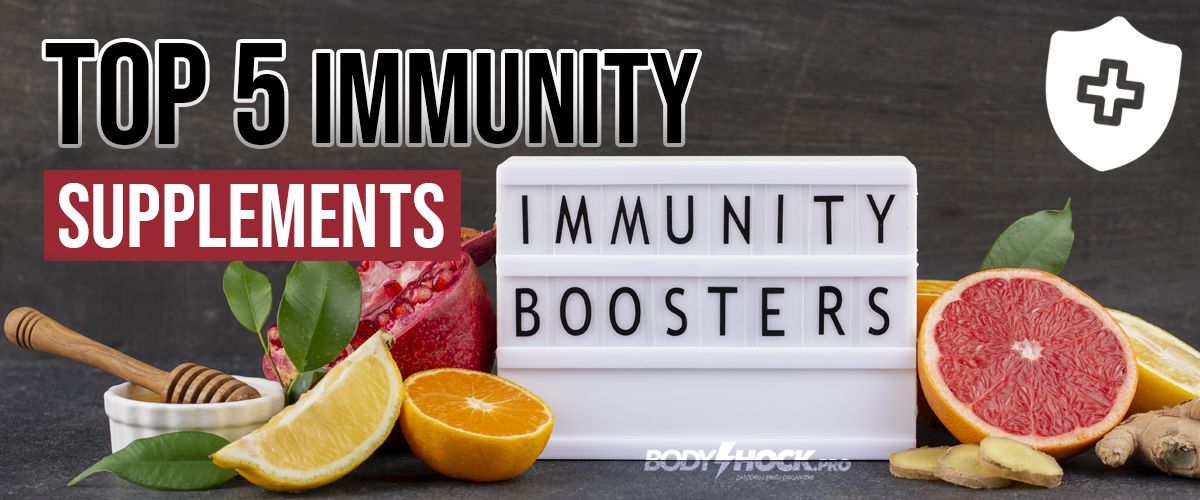TOP 5 Immunity Supplement Ranking

TOP 5 Immunity Supplement Ranking
Immunity dietary supplements are particularly sought after in the fall and winter, when our body is exposed to a number of tests related to weather changes. During this period, we should take special care to ensure that our immune system works at its best. Its efficiency will help fight infections, which will slowly keep our body in impeccable condition.
Below we present a ranking of the 5 best supplements to strengthen immunity, which have been selected based on their effectiveness, composition and popularity among consumers. Here you will find popular dietary supplements that are the basis for immunity, but also products that will allow you to expand the basic products in your supplement arsenal.
1. Vitamin C - a classic in the fight against infections
Vitamin C has been considered one of the most important ingredients supporting the immune system for years. It is a strong antioxidant that neutralizes free radicals, protecting the body from oxidative stress. Regular supplementation of vitamin C can reduce the risk of upper respiratory tract infections, as well as shorten the duration of the disease.
Additionally, vitamin C supports the production of collagen, which affects the condition of the skin, gums and blood vessels, which play an important role in the body's defense processes. When choosing a vitamin C supplement, it is worth paying attention to its bioavailability - forms such as ascorbic acid or sodium ascorbate are very popular, but supplements containing liposomal vitamin C, which is characterized by higher absorption, may be even better.
Vitamin C dosage:
It is recommended to take 500-1000 mg of vitamin C daily, especially during periods of increased risk of illness.
2. D3 + K2 - a duo of supplements for immunity
Vitamin D3 is crucial for the functioning of the immune system. It affects the activity of immune system cells, such as macrophages and T lymphocytes. Vitamin D deficiencies are commonly associated with increased susceptibility to infections, especially colds and flu. Due to limited access to sunlight in the fall and winter, vitamin D3 supplementation becomes essential.
Vitamin K2, on the other hand, works with vitamin D3 to help the body use calcium properly, which in turn affects bone health and the cardiovascular system. The combination of these two vitamins provides comprehensive support not only for immunity, but also for the overall health of the body.
How to dose vitamin D3 with K2?
It is recommended to supplement 2000-4000 IU of vitamin D3 daily, in combination with 100-200 µg of vitamin K2, especially in the autumn and winter.
3. Zinc - an essential mineral for the immune system
Zinc is one of the most important minerals affecting the proper functioning of the immune system. It is involved in the production of T lymphocytes, which play a key role in fighting infections. Zinc deficiencies can lead to weakened immunity and increased susceptibility to infections, including viruses.
Zinc also supports the healing process of wounds and has anti-inflammatory effects. When choosing a supplement, it is worth paying attention to forms such as zinc picolinate, zinc citrate or zinc gluconate, which are characterized by high absorption.
Dosage:
The recommended dose of zinc is 10–30 mg per day, depending on individual needs.
4. Probiotics - the key to healthy intestinal microflora
Probiotics play an extremely important role in supporting the immune system. Healthy intestinal microflora is a protective barrier against pathogens that can cause diseases. Probiotic bacteria such as Lactobacillus and Bifidobacterium help maintain the balance of the intestinal microbiota, which translates into stronger immunity.
Regular use of probiotics can help reduce the frequency of infections, especially in the respiratory system. It is worth choosing preparations containing a variety of bacterial strains and the appropriate amount of them (minimum 10 billion CFU per serving).
Dosage of probiotic supplements
It is recommended to take 1–2 capsules of probiotics daily, preferably on an empty stomach. The dosage depends largely on the product we use.
5. Echinacea - a natural immune booster
Echinacea, or echinacea,is one of the most well-known natural immune boosters. It is valued for its antiviral, antibacterial and anti-inflammatory properties. Echinacea works by increasing the production of interferons – proteins that support the fight against viral infections.
Supplements containing echinacea extracts can help to combat cold and flu symptoms faster, as well as shorten the duration of the disease. Echinacea is most often found in the form of drops, capsules or teas.
Dosage:
It is recommended to take 300–500 mg of echinacea extract 2–3 times a day during periods of increased risk of infection.
What is worth remembering?
Supplementation with appropriately selected preparations can significantly improve the functioning of the immune system, especially during periods when the body is more exposed to infections. Vitamin C, D3 + K2, zinc, probiotics and echinacea are ingredients that support our body at various levels, protecting it against viruses, bacteria and other pathogens. It is important to choose high-quality products and adjust supplementation to the individual needs of the body.
Scientific sources:
Protective effect of vitamin C
https://www.ncbi.nlm.nih.gov/pmc/articles/PMC3783921/
Synergistic effect of vitamin D3 and K2
https://www.ncbi.nlm.nih.gov/pmc/articles/PMC5613455/
Echinacea effect on immunity
https://www.ncbi.nlm.nih.gov/pmc/articles/PMC4441164/







